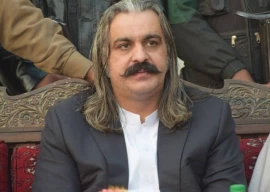
Though the freedom of the press in Pakistan has always remained in jeopardy, the situation in conflict-hit areas is particularly intense.
With four journalists killed in Swat during the mayhem, and several others being detained or facing threats from militants, they are living a life of peril, risk and hazard. Moreover, they are continually exploited and have no job security.
This was the consensus among media personnel while talking to The Express Tribune in connection to World Press Freedom Day on Thursday.
“Journalists in Swat can never report freely, as they are always under pressure from different forces. Neither the administration nor the political forces let them work properly,” said Mahmood Rafiq Babu, a reporter of FM 96.
“For locals our job might seem exciting but they don’t know what troubles we face while reporting,” he said, adding that the media in Swat is nevertheless active in highlighting crucial issues.
Swat Press Club General Secretary Mahboob Ali also shared similar views regarding freedom of the press in general and in Swat in particular.
“We have been fighting for press freedom ever since we joined this profession. Reporting objectively without fear of being threatened is not an easy job in war zones and the tribal belt. Additionally, government officials also try to impose their own will on journalists,” he remarked.
“But despite all of this, I must say that the role of reporters in giving a voice to the people and bringing social injustices to the limelight is highly commendable,” he observed.
Moving on to concerns, Ali said that around 95 per cent of print journalists in Swat do not get salaries and often get sacked without any reason. Moreover, a majority of them enter the profession without any training on how to work in risky areas.
A recently sacked journalist, who requested not to be named, said, “If a person is to end up being jobless by reporting facts, I wonder if it’s better to just remain silent.”
Another journalist, Niaz Ahmad, said, “We are working for the society’s uplift, we share people’s miseries with the world, but we don’t have any life of our own. We don’t get any time for ourselves or for our families. We can even be asked to leave Eid prayers to cover a bomb blast.”
Meanwhile in Mirpur, a ceremony was held to laud the efforts of journalists.
Addressing the participants, speakers demanded the implementation of the 7th wage board award in Azad Jammu and Kashmir (AJK), saying that wage board award commission, headed by Justice (retd) Raja Afrasyab Khan, had categorically ordered the grant to pay pending wages of journalists. Speakers criticised the role of AJK Press Foundation and Press Information Department, saying that the departments have failed to facilitate journalists in need of help.
World Press Freedom Day is a day designated by the United Nations to raise awareness on the importance of freedom of expression in the press. It aims to evaluate press freedom around the world, defend media from attacks on their independence and pay tribute to journalists who have lost their lives in exercise of their professional duties.
(With additional input from AH Nizami in Mirpur)
Published in The Express Tribune, May 4th, 2012.

1732849469-0/women-in-male-field-(1)1732849469-0-165x106.webp)





1732789727-0/BeFunk_§_]__-(68)1732789727-0.jpg)

1732705114-0/Untitled-design-(7)1732705114-0-270x192.webp)
1732745394-0/Diddy-(4)1732745394-0-270x192.webp)






COMMENTS
Comments are moderated and generally will be posted if they are on-topic and not abusive.
For more information, please see our Comments FAQ